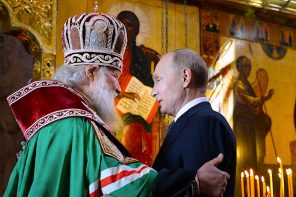“I heard hundreds of these evangelical sermons—heard hundreds of the most fearful and vivid descriptions of the tortures inflicted in hell, of the horrible state of the lost. I supposed that what I heard was true and yet I did not believe it. I said: ‘It is,’ and then I thought: ‘It cannot be.’” —Robert Ingersoll, 1896
I connected instantly with Kate Blanchard’s May 10 piece, “Coming Out As a Heretic.” I too grew up in a Christian family, and, despite very intense Christian devotion and deep soul- and scripture-searching, I “fell away” from the faith in my early twenties. I have been “unchurched” for about six years now and have often struggled to identify my current relationship to the Christian faith.
Simply identifying as an atheist at first felt uncomfortable to me for a number of reasons. All of my family members remained Christian, so it was easier for me to tell them that I was “searching,” or at least agnostic, rather than atheist. Additionally, I wasn’t sure that the label applied to me. Finally, now, as a historian of religion, when I introduce myself to strangers, they inevitably ask me about my religious commitments. When I explain that I have none, I often sense a series of judgments about who I am, just by admitting my unbelief.
I struggled long and hard with my faith, and it was incredibly difficult to leave my family’s church. However, I have come to realize that one of the reasons that I left was because of my deep commitment to the faith. When I recognized that I no longer agreed with several of the fundamental tenets of Christianity, I knew that I didn’t belong in my church community anymore—particularly because the church I grew up in emphasized strict adherence to its doctrine. In short, I became a nonbeliever because I took very seriously Christianity and its truth claims, not because I found them laughable.
Given that many people currently understand the term atheist to mean, as Blanchard put it, “militant secularism,” I find her idea that a heretic can “claim some connection to Christianity” appealing. I also want a name that implies the depth of my engagement with the faith, as well as my continued respect for it through my academic study. However, I wonder whether replacing atheist with heretic is the best option.
In my life after orthodox Christianity, it is unsurprising that I have found myself associating with nonbelievers and nontraditional believers of many stripes—including many self-avowed atheists. Do these individuals fall into Blanchard’s description of atheists as intellectual elitists? Sometimes. However, more often than not, they are people like Blanchard and me who can recognize both the good and the bad in various religious traditions.
Yet they insist that I, and others like me, who doubt the existence of God or gods, am in fact an atheist by definition. Thus, they argue that, while atheism and heresy may refer to two different things—lack of belief in god and an outsider-insider relationship to the Christian tradition, respectively—heretics should be more willing to own up to their de facto atheism.
When I’ve asked them why it matters so much to them to include us in the atheist camp, they’ve responded that atheism needs moderates like us. One of my friends in particular compares the way that people think of the term atheism to the way that they think of the term feminist. By this he means that over time many people who support women’s rights have shied away from using the term because it has become associated, rightly or wrongly, with an especially negative, single-minded person.
For instance, when this friend was the teaching assistant for a class on 20th-century American history, the professor emphasized women’s rights and feminism throughout the course. At the end of the semester, the professor asked the students how many of them believed in equal rights for women. Almost the entire class raised their hands. However, when he asked them how many of them were feminists, a much smaller number raised their hands. The professor and my friend could only conclude that the reason for this disparity was linked to negative connotations that students have with the word “feminist.”
I wonder whether we questioners, unbelievers, and heretics have allowed ourselves to be cowed by the likes of Richard Dawkins from embracing an identity that belongs to all of us? After all, public atheism or agnosticism hasn’t always had such an unpopular public face. Robert Ingersoll, a leading figure in the Free Thought movement of the late 19th century, was at one time the most popular speaker on the U.S. speaking circuit.
Ingersoll was well known for being a loving family man and an ethical leader in his community—as a public unbeliever. Though he criticized Christianity and religion in general, he did so from a place of sincere engagement with its ideas. And while he was a self-styled agnostic rather than an atheist, his positive leadership is something all of us doubters and unbelievers could aspire to.
If we heretics want to occupy our fair share of the discussions about the role of religion in the public sphere, ethics, and even about the meaning of religion, maybe it’s time to invoke the spirit of Robert Ingersoll and take back the atheist label. Or, if nothing else, to allow that atheists may be heretics too.




